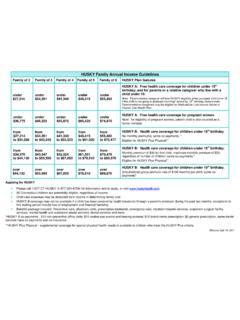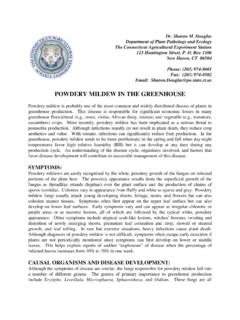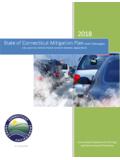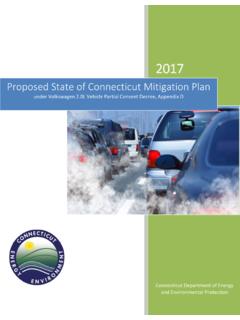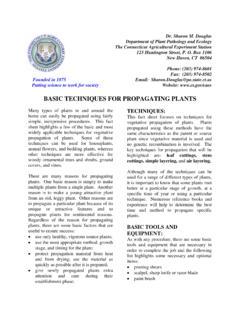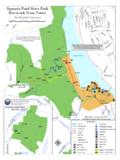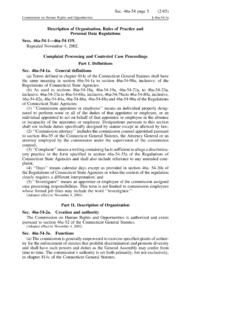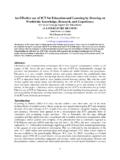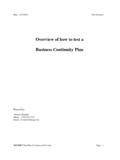Transcription of Connecticut Core Knowledge and Competency …
1 Connecticut Core Knowledge and Competency framework for Professionals working with Young Children and Their Families Connecticut Office of Early Childhood 1. October 2016. Special thanks to: Peg Oliveira, an independent consultant who facilitated many conversations and authored numerous drafts of this framework ; the 2012 Workforce Workgroup of the Early Childhood Cabinet for initial funding to support large stakeholder meetings and subcommittee work; Alison Lutton, independent consultant;. and Linda Warren, President of Early Childhood Associates, for insightful comments on earlier drafts. Document design and layout by Studio 63, LLC, Bethany, Connecticut . Connecticut Office of Early Childhood 2. I am pleased to introduce the Connecticut Core Knowledge and Competency framework for Professionals working with Young Children and Their Families (CT CKCs). The CT CKCs serve as the foundational Knowledge and skills for the early childhood workforce, no matter where interactions with children and families occur.
2 Core Knowledge and Competency Frameworks refer to the expectations for what the workforce should know (content) and be able to do (skills). in their role working with and/or on behalf of children and their families. They provide a foundation for professional learning decisions, professional development design, and quality improvement efforts.. The CT CKCs were developed based on the recommendations outlined in the Transforming the Workforce for Children Birth Through Age 8: A Unifying Foundation authored by the Institute of Medicine and National Research Council of the National Academies (2015). The Connecticut Office of Early Childhood (OEC) is excited to present this work as a valuable resource across disciplines and settings to build professional learning opportunities and quality improvement. You will notice two parts to the document: a shared core that represents Knowledge and skills evident in roles such as teachers and caregivers, home visitors, health and mental health consultants, and interventionists such as birth to three providers; and a unique core that represents additional Knowledge and skills for teachers and caregivers in any setting.
3 Levels 1 and 2 of the CT CKCs are considered the shared core to promote a unified basic understanding across early childhood roles about: How children develop and learn;. The importance of nurturing stable and engaging relationships;. Understanding environmental factors that positively or negatively impact development, such as toxic stress and trauma;. Supporting healthy environments;. U. nderstanding how observation and assessment work together to help identify child and family needs that inform a meaningful and relevant plan for child and family success;. Promoting positive social and emotional behaviors; and Serving as a professional and advocate for all young children and their families. Connecticut 's vision is that all who assist young children and families, no matter the setting, will be confident and competent individuals able to support each child's growth and development in partnership with families as well as resource and referral networks.
4 Myra Jones-Taylor, Commissioner, Connecticut Office of Early Childhood LeMoine, S., NAEYC 2008. Workforce Designs: A Policy Blueprint for State Early Childhood professional Development Systems. Connecticut Office Connecticut Office of of Early Early Childhood 3. Childhood 3. TABLE OF CONTENTS. Overview Introduction .. 7. Core Beliefs .. 10. Guiding Principles of Practice .. 12. Document Organization .. 13. Domain Descriptions .. 16. Conceptual framework .. 23. Domains and Indicators .. 25. Domain 1: Promoting Child Development and Learning .. 29. Domain 2: Using Developmentally Effective Approaches for Facilitating Experiences .. 45. Domain 3: Building a Meaningful Planned Program of Learning and Development .. 61. Domain 4: Observing, Documenting, and Assessing .. 81. Domain 5: Building Family and Community Relationships .. 97. Domain 6: Promoting Health, Safety, and Wellness.
5 113. Domain 7: Practicing Professionalism and Advocacy .. 131. Appendix Glossary of Terms .. 145. References .. 151. Stakeholder Engagement .. 155. Connecticut Office of Early Childhood 5. INTRODUCTION. THE Connecticut CORE Knowledge AND Competency framework FOR. PROFESSIONALS working WITH YOUNG CHILDREN AND THEIR FAMILIES. Those closest to children and families are critically important to holistically support each and every child, birth to age five, and their families. The research is clear that young children thrive when supported by nurturing adults who are intentional about engaging the whole child. Research about the developing brain and the importance of supportive environments and interactions that impact brain development is relevant to the entire early childhood workforce, regardless of role. Therefore, in consideration of the Institute of Medicine and the National Research Council recommendations regarding shared competencies, Connecticut created a shared set of core Knowledge and competencies as foundational for interdisciplinary professional development and pre-service education.
6 While the scope of this framework is inclusive of children birth to age five, we recognize the overlap with public school systems that serve young children within the age band considered early childhood, which is through age eight. The core Knowledge and competencies outlined Young children thrive in this framework intersect, not in entirety, with the core Knowledge and certification requirements for when they have secure, personnel serving young children in the public school system. positive relationships with adults who are The Connecticut Core Knowledge and Competency framework for Professionals working with Young knowledgeable about Children and Their Families includes perspectives from Education, Special Education and Early Intervention, how to support their Health, Mental Health, and Social Service disciplines to address the early childhood workforce that works development and most closely with children ages birth to five and their families.
7 The roles addressed in this document include learning and responsive teachers in any variety of settings, home visitors, interventionists, and mental health professionals as to their individual appropriate. This shared core provides a set of competencies from a multidisciplinary lens that will be progress. used as a foundation to construct or adopt role-specific competencies beyond those addressed in the shared core. Levels 1 and 2 in the Domains and Indicators section identify the shared core across roles, and Levels IOM/NRC, 2015. 3 and 4 identify the unique Knowledge and competencies that build upon the shared core for the role of teacher and/or caregiver in any setting. Figure 1 depicts how the concept of a shared core is the foundation for building unique sets of Competency frameworks for various early childhood roles. Connecticut Office of Early Childhood 7. INTRODUCTION.
8 What Foundational Competencies are Shared Across Early Childhood Roles and What Competencies are Unique in Any Given Role? Center-based Family Childcare Public School Assistant Teacher Teacher Provider Teacher or Paraprofessional Unique Unique Unique Unique Competencies Competencies Competencies Competencies Shared Competencies for Professionals Engaging with Children and Families B-3 and Mental Health Special Education Home Visitor Consultant Integrated Early Interventionist Unique Unique Unique Competencies Childhood professional Competencies Competencies Development System: Figure 1. A comprehensive system of preparation and What are Core Knowledge and Competency Frameworks? ongoing development C. ore Knowledge and competencies refer to the expectations for what the workforce should know (content). and support for all early and be able to do (skills) in their role working with and/or on behalf of children and their families.
9 They childhood professionals provide a foundation for professional development design (including instructional practices) and other working with and on quality improvement efforts. LeMoine, S., NAEYC 2008. Workforce Designs: A Policy Blueprint for State Early Childhood professional Development Systems. behalf of young children. An integrated system Why Have Shared Core Knowledge and Competencies? crosses sectors serving early childhood education To create a common language across disciplines and roles. professionals working To create a common thread of professional development expectations for Competency growth. in direct and non-direct service roles. To better serve children and families in reaching their goals, as the more we know, the better they grow.. Connecticut Office of Early Childhood (OEC). NAEYC Workforce Designs T o develop interdisciplinary training and support aligned articulation across higher education institutions, professional development entities, and public policy work across agencies.
10 Connecticut Office of Early Childhood 8. INTRODUCTION. Connecticut 's Core Knowledge and Competencies Will Be Used To: Inform practice. G uide professional development design to keep current with emerging practice across disciplines and roles. Inform policy regarding workforce development. Provide a common language in contracting and planning for professional development. Provide guidance in settings where professional development goals are developed. P. rovide the Office of Early Childhood and other agencies with language to collaborate with higher education institutions and professional development designers around shared workforce goals. S upport higher education institutions to assess their current planned programs of study using the CKCs to address articulation across institutions. A. ssist the OEC Early Childhood professional Registry in organizing data on training offered and individual learning recordkeeping.
